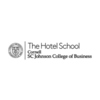Hold the Phone: Cornell Study Shows Value of Telephone and Online Reservations
Restaurant Industry Research Stresses Importance of Offering Both Methods, to Cater to Customer Needs for Convenience and Personal Touch
Restaurant customers like the convenience of the internet, but they appreciate the personal touch of telephone reservations, according to a new restaurant industry study from Cornell's Center for Hospitality Research. The study found that nearly one-third of the 696 restaurant customers surveyed had made an online reservation, and those respondents tended to be young, relatively frequent guests. The restaurant business report, "How Restaurant Customers View Online Reservations," by Sheryl E. Kimes, is available at no charge from the center at http://www.hotelschool.cornell.edu/research/chr/pubs/reports/2009.html.
"Not surprisingly, the respondents said that online reservations were convenient," said Kimes, who is the Singapore Tourism Board Distinguished Professor of Asian Hospitality Management at the Cornell School of Hotel Administration. "But at the same time, these restaurant customers did not want to give up entirely on the personal connection with the restaurant that is only possible with a phone call. For that reason, I suggest that restaurants consider using both methods when they accept reservations."
No Significant Difference in Ratings of Control and Reliability by Phone or Online, According to Restaurant Industry Research
To be part of the survey, the respondents had to have made a restaurant reservation at least once in the twelve months before the study. The respondents were asked to rate the control, convenience, reliability, and perceived service orientation of a restaurant for both online and telephone reservations. The restaurant industry research analysis found no significant difference in ratings on control or reliability. The difference between online reservations and telephone reservations involved the convenience of online reservations and the perceptions of the restaurant's service orientation relating to telephone reservations.
"Based on this survey, I suggest that restaurant operators encourage their guests to try online reservations," said Kimes. "While there are costs associated with online reservations, the additional benefits associated with them more than outweigh the costs. For example, restaurant operators can learn more about their customers and be able to do a better job of meeting customers' preferences. Online reservations also allow for automatic reminders, instead of having an employee make a phone call to confirm a reservation."
Thanks to the support of the Center for Hospitality Research partners listed below, all publications posted on the center's website are available free of charge, at www.chr.cornell.edu.
About the Center for Hospitality Research
The purpose of the Center for Hospitality Research is to enable and conduct research of significance to the global hospitality and related service industries. CHR also works to improve the connections between academe and industry, continuing the School of Hotel Administration's long-standing tradition of service to the hospitality industry. Founded in 1992, CHR remains the industry's foremost creator and distributor of timely research, all of which is posted at no charge for all to use. In addition to its industry advisory board, CHR convenes several industry roundtables each year for the purpose of identifying new issues affecting the hospitality industry.
Center Members: Accenture • Access Point Financial, Inc. • Barclaycard US • Cvent • Davis & Gilbert LLP • Deloitte & Touche USA LLP • DerbySoft • Four Seasons Hotels and Resorts • Fox Rothschild LLP • Hilton Worldwide • Host Hotels & Resorts • Hyatt Hotels Corporation • IDeaS Revenue Solutions • InterContinental Hotels Group • Jumeirah Group • Marriott International • NTT DATA • Preferred Hotels & Resorts • priceline.com • PwC • The Rainmaker Group • RateGain • ReviewPro • Revinate • Sabre Hospitality Solutions • STR • Taj Hotels Resorts and Palaces • Tata Consultancy Services • Wipro EcoEnergy • Wyndham Hotel Group
Glenn Withiam
607.255.3025
CHR
